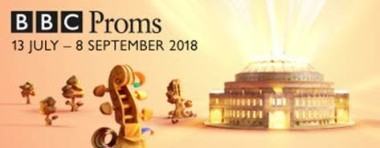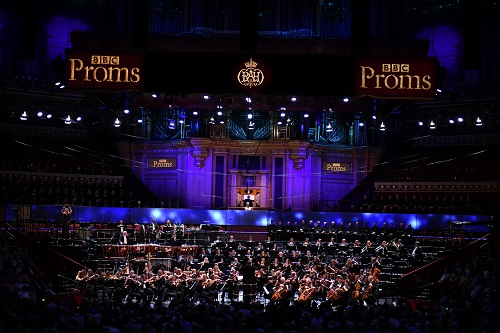
 United Kingdom Prom 1 – Knussen, Vaughan Williams, Holst, Meredith: National Youth Choir of Great Britain, BBC Symphony Chorus, BBC Proms Youth Ensemble, BBC Symphony Orchestra / Sakari Oramo (conductor). Royal Albert Hall, London, 13.7.2018. (CC)
United Kingdom Prom 1 – Knussen, Vaughan Williams, Holst, Meredith: National Youth Choir of Great Britain, BBC Symphony Chorus, BBC Proms Youth Ensemble, BBC Symphony Orchestra / Sakari Oramo (conductor). Royal Albert Hall, London, 13.7.2018. (CC)

National Youth Choir of Great Britain & Sakari Oramo (conductor) (c) Chris Christodoulou
Knussen – Flourish with Fireworks, Op.22
Vaughan Williams – Towards the Unknown Region
Holst – The Planets, Op.32
Anna Meredith – Five Telegrams (World Premiere)
And so, the seasons turn and once more we find ourselves at the outset of a new Proms season: this time one laced with sadness at the news of the death of the composer Oliver Knussen (1952-2018). The chosen piece was Flourish with Fireworks, written in August/September 1988 for Michael Tilson Thomas’ first season as Principal Conductor of the LSO. Knussen envisaged it as a ‘triple tribute’: to MTT, to the London Symphony Orchestra and to Stravinsky (whose piece Fireworks is honoured in Knussen’s title). A musical cipher (the musical equivalents of LSO and MTT based on sol-fa) provides the intervallic basis for the work. The BBC Symphony Orchestra was on fine form, Knussen’s gestural, glittering music housing lush, long melodies. The inclusion was too late for the programme booklet, so a slip explaining what we were hearing made it into most programmes (sadly, not mine, leaving my guest – whose eyesight clearly is far better than mine – to find the two ‘F’s on the score that Oramo waved at the audience during the applause).
The title of the Vaughan Williams, Towards the Unknown Region, refers to death and sets the poet Walt Whitman: the composer’s next major setting of Whitman was to be A Sea Symphony (a piece itself perfectly suited to the Proms, of course). This was a powerful performance, the lower brass beautifully creamy of tone, the chorus’ octaves perfectly clean. Vaughan Williams packs huge contrasts within a span that lasts less than a quarter of an hour, from fragile solo strings (beautifully realised here) to a radiant closing hymn.
A quintessentially Proms piece, Holst’s The Planets (no Colin Matthews Pluto) was given in a no-nonsense reading. A light show, a sort of ‘mini-me’ (‘micro-me,’ really) version of Anna Meredith’s, was present: a strip at the back of the stage, with pulsating globes of light indicating celestial bodies. ‘Mars, the Bringer of War’, linking most explicitly to the 1918/2018 centenary theme perhaps, was fast, the hard sticks for the timpani underlying the relentlessness. The Royal Albert Hall acoustic ate up some textures and lines, inevitably, but there was no doubting the power. A very mobile ‘Venus’, again part of Oramo’s no-nonsense approach, led to a ‘Mercury’ that felt just a tad under-tempo. There was no space between the various sections of ‘Jupiter’, and Oramo laudably refused to wallow in the ‘big tune’. Oramo paced ‘Saturn’ superbly, the onward tread and its crescendo perfectly judged. Finally, the female voices of the National Youth Choir of Great Britain, boasting a beautifully open-throated sound, led the music into nothingness at the close of ‘Neptune’. A stimulating reading.
In an interview with The Guardian, Anna Meredith talks about her shared intent with 59 Productions: they had no intention of giving us ‘poppy petals gently falling.’ Seeking inspiration at the Imperial War Museum, Meredith lighted on field postcards that were sent from the battlefield back home. They essentially comprise a selection of set phrases that the sender deleted as appropriate (‘I am quite well’/I have been admitted into hospital sick/wounded’ etc) with only their name and the date added. Anything else, and the postcard was destroyed. This was the starting point, in that all five sections that comprise the piece deal with different methods of communication (including, topically, ‘fake news’). Meredith uses a large orchestra, along with the ten trombones of the Proms Youth Ensemble (split into two groups across the front of the choir stalls), four euphoniums, six trumpets and a barrage of percussion. The light show, courtesy of 59 Productions, was projected over the orchestra and choir and the adjoining spaces, a riot of colour
There was actually a stand-alone performance the night before, where the visuals were projected onto the outside of the Albert Hall. Here, they were projected around the auditorium, a stream of light shapes and, occasionally, images that indeed complemented the music. The first movement, ‘Spin’, trades on the exaggeration and distortion of her musical material, reflecting distortion of truth (‘false news,’ in other words). Shards of chords punctuate the soundstage; brass seem to imitate war sirens. Words are projected, too: ‘Brave,’ ‘Increase’ etc. The second item, ‘Field Postcard’, refers to the method of communication outlined above: most simply said ‘I am well’, and Meredith concentrates on that as a sort of cantus firmus. The choir sang in a particular gesture, hands down by their sides with the palms facing the audience, almost a gesture of supplication, of pleading. ‘Redaction’ featured lines and blocks of colour as the music is stripped bare. Quiet, Balinese-sounding percussion against pizzicato pianissimo strings created one of the more memorable musical memories from the evening. The fourth movement, ‘Codes’ finds mechanical systems overlapping, a musical representation of the act of code-breaking, of a search for patterns. Finally, ‘Armistice’, with the lights and sounds converging on the mighty Royal Albert Hall organ (at its full-throttle moment, the lights seemed to then emanate from the instrument). Lots of gesture throughout; Meredith provides high-impact music in the moment.
It is good to see Anna Meredith getting such a (pardon the pun) spotlit position: she provided the piece froms for five symphony orchestras for the 2008 Last Night. Whether the piece is more than the sum of its parts is another matter, as little of the actual musical material is particularly memorable; Five Telegrams lasts around 22 minutes in total – it actually felt longer – leaving us with a very top-heavy concert in terms of duration. Given the rather strange 8.15pm start time, this was an oddly-structured event. Of the several First Nights I have covered, this left the least sense of anticipation for the upcoming season.
Colin Clarke
For more about the 2018 BBC Proms click here.
The Proms are back and, sadly, so too is the self-indulgent and irritating habit that has grown up in recent years amongst a section of the Proms audience whereby individual movements are applauded. Granted, the movements of ‘The Planets’ are self-standing but the applause that followed the first few movements last night just broke concentration. Thank goodness Sakari Oramo managed to thwart the applauders after each of the last three Planets.
We don’t encounter this intrusive applause at other concerts throughout the year so why do some members of the Proms audience behave in this way? It’s very inconsiderate towards other listeners, both in the hall and on radio/TV.